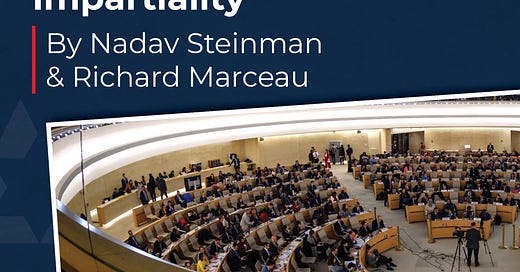In May 27, 2021, the United Nations Human Rights Council (UNHRC) resolved to conduct an open-ended commission of inquiry (COI) to investigate “all alleged violations and abuses of international human rights law” by Israel in its territories.
This COI was created in the wake of the war of self-defence Israel was forced to wage against Hamas (a listed terrorist entity in Canada) in May 2021, a war initiated by Hamas during which the Iranian-backed terror group indiscriminately fired more than 4,000 missiles at Israeli civilians. The COI makes no mention of Hamas or any other militant Palestinian groups who target Israelis with violence to advance cynical political objectives.
The COI was supported by Russia, China, and Venezuela, undemocratic countries whose human rights violations are as egregious as they are well documented. By comparison, sister democracies and Canadian allies, such as Denmark, Holland, Japan, and Italy, voted against the resolution.
This inquisition is unprecedented and should concern anyone who follows the work of this important international institution and who believes in its mission to “maintain international peace and security.”
A biased COI is at odds with Canadian precedent and the values of impartiality and objectivity we cherish. Since Confederation, Canada has an impressive history of commissions of inquiry conducted thoroughly and fairly, a practice that continues to this day. Inquiries have been chaired by esteemed Canadians such as Frank Iacobucci, Willard Z. Estey, and Rosalie Silberman Abella, who served, or would later serve, as Justices of the Supreme Court of Canada. Prime Minister William Lyon Mackenzie King had the honour of being Chair of four separate Commissions of Inquiry between 1907 and 1908.
The foundation of Canada’s 370 domestic COIs to date is their indisputable impartiality, which has fostered public confidence in their findings and pride in their legal record.
This COI contravenes the impartial standard Canada holds dear and violates the UN’s own standards dictating that those undertaking the investigations should “in all cases, have a proven record of independence and impartiality. It is also important to ensure that the background of candidates, prior public statements or political or other affiliations do not affect their independence or impartiality, or create perceptions of bias.”
South African jurist Navanethem Pillay was selected as chair of the UNHRC COI focused on Israel. Ms. Pillay has an impressive resumé that qualifies her generally to serve on COIs. Regarding Israel, however, she has a well-documented bias which, according to the UN’s own guidelines, should disqualify her from participating in this COI.
Justice Pillay has accused Israel of apartheid and claims to be “very pleased” with the BDS (boycott, disinvestment, sanction) campaign against Israel. Historically, Canadian Prime Ministers, conversely, have condemned this campaign, rightly calling it antisemitic. Pillay hailed the “huge victory” against Israel when the UNHRC issued a blacklist against companies doing business in the territories. She publicly supported probes into “Israel’s war crimes” and lent her signature to petitions demanding further investigations targeting Israel. Despite these and other demonstrations of her bias, the UNHRC nevertheless appointed her to chair the COI, a decision that, by exposing the bias of the UNHCR against the Jewish state, is itself deeply troubling.
Justice Pillay is certainly entitled to her views on Israel. But those views, expressed repeatedly and publicly, call her impartiality into question, and should disqualify her from this role.
While it has, unfortunately, become standard for the UN to ignore its own guidelines of impartiality when it comes to Israel, we expect more from our own government.
Canada should recognize and refute this failure publicly. Given Canada’s domestic experience regarding impartial COIs and clear foreign policy values of supporting the credibility of international institutions, we call on our government to reject the findings of this biased commission. The dictum “Justice must not only be done but must also be seen to be done” is an important principle of our legal tradition.
By June 13, at the start of the UNHRC’s session, Justice Pillay will release her report, one that will be informed by her personal bias. The world will once again condemn Israel yet remain silent about the UN’s disregard for its own guidelines and principles intended to assure the integrity of its COI.
To maintain its own credibility and to urge reform at the UN, Canada must demonstrate leadership and reject this report.
Nadav Steinman is the Chair of the International Legal Forum and corporate partner (retired) at Norton Rose Fulbright.
Richard Marceau is Vice President and General Counsel at the Centre for Israel and Jewish Affairs (CIJA) and a former Member of Canadian Parliament.




